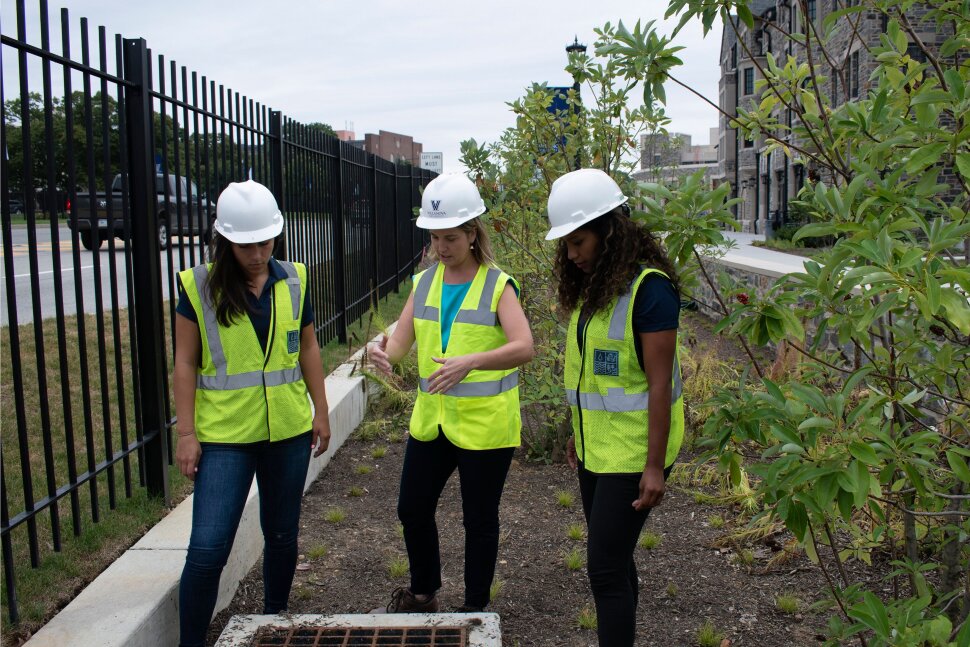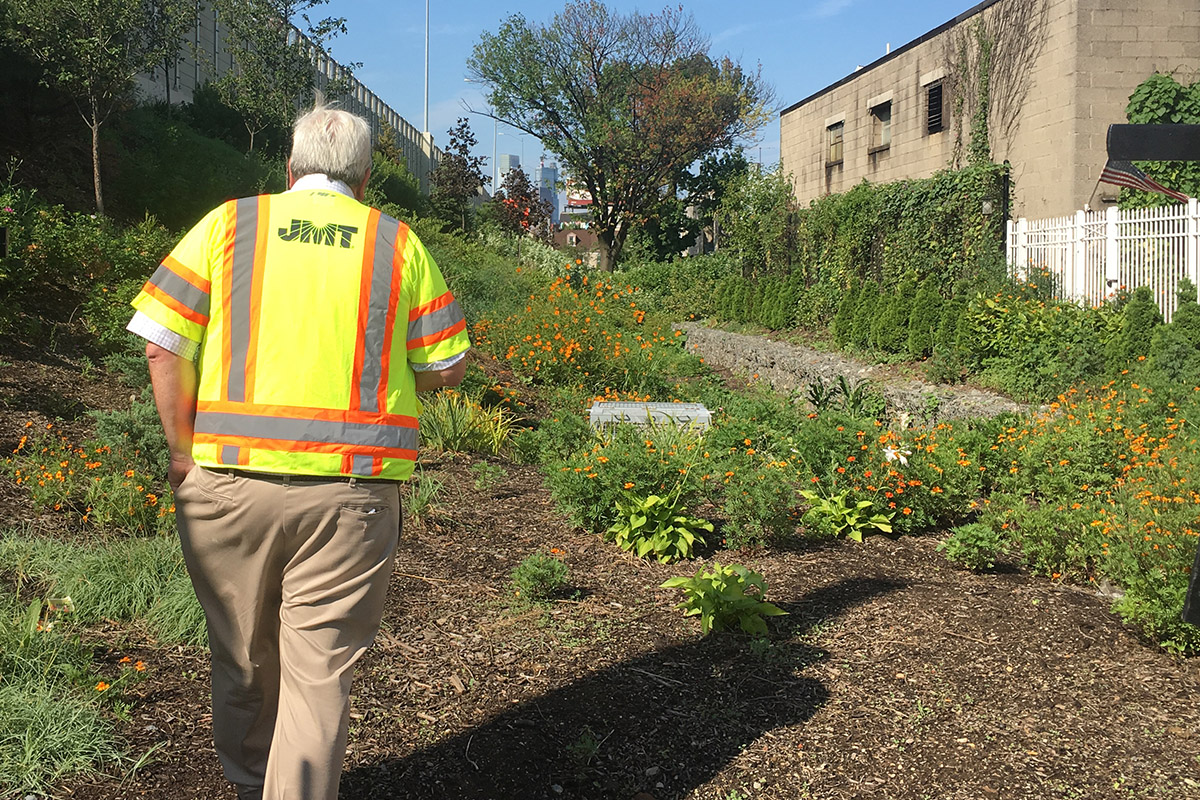Protecting Our Most Precious Natural Resource
How Kristin Sample-Lord, PhD, is advancing research in water security and environmental protection

Villanova Engineers lead the field
of sustainable stormwater management
It’s been less than a year since Hurricane Ian made landfall as a Category 4 storm in Florida, with 150 mph winds and 15-foot tidal surges of stormwater that decimated homes and businesses and reduced entire neighborhoods to rubble.
With damage estimates over $100 billion, it is the costliest hurricane to hit Florida and one of the most catastrophic in recent US history. Unfortunately, it’s far from an isolated event—flooding is the most common natural disaster worldwide and it’s wreaked havoc for millions of years.
“Since the time of Noah, we’ve been looking for a flood workaround,” says Virginia Smith, PhD, associate professor of Civil and Environmental Engineering. “In the history of humanity, every time we have had a seemingly impossible challenge, like water management, humans have created exciting opportunities to overcome the obstacle, and this is one of those moments. We’re at a point in history where we’re uniquely positioned to tackle it.”
Although flooding is an age-old problem, factors like climate change, population growth in urban areas and deteriorating infrastructure present new challenges in stormwater management. Faculty researchers at the Villanova Center for Resilient Water Systems (VCRWS) have worked since 1998 to create sustainable, innovative engineering solutions to tackle these types of challenges now and in the future.
“From our research on campus, we have created novel approaches, perspectives and strategies that have changed the profession on an international scale,” says Robert Traver, PhD, ’82 MS, director of the center and professor of Civil and Environmental Engineering.
“ In the history of humanity, every time we had a seemingly impossible challenge, like water management, humans have created exciting opportunities to overcome the obstacle. ”
- Virginia Smith, PhD
Over the past 20 years, Civil and Environmental Engineering faculty and students have slowly retrofitted Villanova’s campus into one of the first and leading green stormwater infrastructure (GSI) research sites in the country.
“We are an international leader in urban green stormwater infrastructure,” says Bridget Wadzuk, PhD, ’00 COE, the Edward A. Daylor Chair in Civil Engineering and the college’s director of Strategic Initiatives. “Our whole campus is a living lab.”
GSI is an approach to managing stormwater in ways that mimic the natural environment as much as possible to filter stormwater more effectively. This prevents polluted stormwater runoff from entering local waterways and reduces flooding during heavy rainfall events.
Working in collaboration with the University’s Facilities Management department, Engineering faculty and students have implemented more than 20 GSI sites across Villanova’s campus.
Stormwater that had previously been ushered from campus into treatment plants or local rivers and streams via gutters, storm drains and pipes is now intercepted, caught and reused by a variety of GSI—from rain gardens to wetlands, green roofs, pervious concrete, permeable pavers and bioswales.
Each and every one of these campus GSI sites is generating data that contributes to a crucial body of research with global implications. “The breadth of data is unmatched,” says Dr. Wadzuk. “We have the longest data set on various green stormwater infrastructures in the world.”
Year after year, undergraduate and graduate Engineering students work closely with Civil and Environmental Engineering faculty to maintain each site, monitor sensors, collect samples for water quality analysis, create numerical models and analyze the data. “The students are critical to our work,” says Dr. Wadzuk.
This vital information helps Villanova researchers to engineer resilient solutions to global water challenges that redirect and harness the power of stormwater.
Villanova’s first GSI is a perfect example. Dr. Traver installed a rain garden on the University’s West Campus in 2001 to collect stormwater runoff from parking lots. Faculty and students have continuously monitored this rain garden since 2003, collecting stats every five minutes that have generated millions of data points.
Because the rain garden mimics the natural hydrology of what a meadow or forest would do in the same scenario, the findings have broad applications far beyond Villanova. The data shows that this rain garden successfully manages about 85 percent of the rain water in the West Campus watershed.
“With 20 years of data on one site, we can really see how the system is performing over the long term, and we can prove GSI is an efficient and effective way to manage stormwater,” Dr. Traver says.

With the help of artificial intelligence (AI), Dr. Smith and Dr. Wadzuk are harnessing data collected through GSI monitoring—including the millions of data points from Villanova’s campus—to predict how infrastructure will perform when flooding occurs.
This information allows them to develop physics-based models to better understand the systems, and also see connectors and drivers of flooding that previously weren’t apparent.
They're also applying the technology to better understand flooding. Each year, billions of dollars are spent on flood recovery, but until recently, there hasn’t been a good way to track where flooding occurred.
“Unless someone goes out and physically measures the extent of a flood, there is no flood record available,” Dr. Smith explains. Plus, it’s not a perfect science—most existing urban flood models are very complex, have some level of inaccuracy and are subject to change.
“We can see the world totally differently than we could just 10 years ago, and we can use this data to illuminate new solutions,” Dr. Smith says. “Urban areas are continuing to grow and flooding is going to be a challenge, but with AI and the data that new technology can provide, we now have the tools to meet it.”
In addition to AI, synthetic aperture radar (SAR) is one of those tools. More sophisticated than standard satellite imaging, which is limited by light and weather conditions, this remote sensing technology can create an image of the Earth’s surface in all weather and at any time.
Using AI SAR data, Dr. Smith and her colleague, Peleg Kremer, PhD, assistant professor of Geography and the Environment, are working to pinpoint where flooding occurs around the world, from Texas to Sierra Leone to Bangladesh. In turn, she can use this information to predict ideal locations for stormwater infrastructure that can mitigate potential disasters—all from her desk at Villanova.

Through all of their efforts, the center’s faculty are working toward a greater understanding of how stormwater systems work, which in turn helps establish best practices that provide better regulation and management of those systems and improves public infrastructure.
With their deep well of expertise in this area, Villanova Engineers are at the forefront of a current initiative—the largest in the nation—to construct GSI to sharply reduce polluted stormwater runoff.
A Villanova team led by Dr. Traver is working with the Pennsylvania Department of Transportation and its infrastructure consulting firm, AECOM, on a multi-year Interstate 95 highway reconstruction and improvement project along the Delaware River waterfront in the Philadelphia region.
Since 2017, center researchers, including Kristin Sample-Lord, PhD, associate professor of Civil and Environmental Engineering, and Garrett Clayton, PhD, associate dean for Graduate Studies and professor of Mechanical Engineering—and more than a dozen Civil Engineering graduate students have closely monitored the performance of complex GSI systems built along portions of I-95 to mitigate the impact of highway runoff and reduce water pollution.
“We can apply what we’ve learned on campus to our work on I-95, and after years of studying these sites, we will be able to prove how well they perform,” says Dr. Traver. “We are pioneers in this work and our findings will not only inform future plans and improvements for this highway, but will also serve as a model for highways across the country and even around the world.”
Their work also has a direct impact on residents living close to I-95, who are now enjoying the benefit of new greenscape in their neighborhoods, with some even using the spaces as parks.
Partnering with community members is an important aspect of the work the center does. In Eastwick, the most flood-prone neighborhood in Philadelphia and the city’s lowest physical point, Dr. Wadzuk, Dr. Smith, Dr. Kremer and Xun Jiao, PhD, assistant professor of Electrical and Computer Engineering, are bringing residents into the decision-making process to determine which technologies and GSI will best meet their needs.
“The Eastwick community has been repeatedly hit by flooding and other environmental issues,” says Dr. Wadzuk. “Like many marginalized communities, Eastwick has been historically overburdened—environmentally, socially and economically.”
In addition to suffering devastating flood damage from major storms over the years, Eastwick was developed adjacent to a former toxic landfill, and the Environmental Protection Agency declared the neighborhood a contaminated Superfund site in 2001.
Ultimately, Dr. Wadzuk and Dr. Smith hope their research will improve the urban environment and contribute to social equity by creating plans to improve cities’ efforts to effectively and equally address federal water quality and safety needs.
To develop a plan that merges engineering technology with community stormwater needs, the professors are forming an advisory group composed of Eastwick citizens as well as community members from other marginalized and environmentally disadvantaged areas.
“We want our impact to be large,” Dr. Wadzuk says. “The knowledge that we learn from Eastwick community members and others, coupled with the research that we’re doing, can be applicable anywhere, benefiting the wider community on both a national and international level.”
“ It is our hope that municipalities and consultants take what they learn at Villanova and work together to apply it in the communities, igniting positive change and creating resilient stormwater solutions. ”
- Robert Traver, PhD, ’82 MS
The center’s partnerships, forged over the decades with industry and government leaders as well as with communities affected by stormwater, have made Villanova a sought-after resource for novel research and groundbreaking technology.
Through community outreach and events, the center’s faculty influence municipalities to understand that not only is GSI efficient and effective at meeting local, state and federal water regulations, but it is also a cost-effective way to replace outdated stormwater infrastructure and alleviate the cost of flood recovery.
Since 1998, Villanova has hosted the Pennsylvania Stormwater Management Symposium, the leading convener of experts dedicated to promoting GSI to combat urban flooding and protect environmental quality.
The symposium presents the latest in stormwater management research, innovation and technology to industry leaders. The 2022 symposium theme was “Infrastructure, Resilience, Equity,” shedding light on the importance of environmental justice when planning and designing stormwater systems to benefit all communities.
“This symposium brings together the top minds in the field to present our research,” says Dr. Traver. “It is our hope that municipalities and consultants take what they learn at Villanova and work together to apply it in their communities, igniting positive change and creating resilient stormwater solutions.” ■
NEXT IN FEATURES
Villanova is preparing the next generation of church stewards and scholars